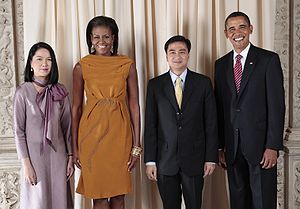 Image via WikipediaThailand: Why is Obama silent?
Image via WikipediaThailand: Why is Obama silent? Sunday, May 30, 2010
By Shamus Cooke
When the White House is quiet as protesters are butchered in the streets of Bangkok, suspicions are raised. Silence often equals complicity.
One can only imagine what the US government’s response would be to a Venezuelan government slaughter: the US media and US President Barack Obama would loudly condemn such an act.
The history of US-Thailand relations explains why. During the Vietnam War, the US used Thailand as one of the main “anti-communist” bulwarks in an area that included China, Vietnam and other countries that were challenging capitalism.
Thailand was thus transformed into a US client state and given money, guns and US government intelligence to battle Thailand’s “communists”.
This relationship has resulted in many Thai dictatorships that have a very bloody history. This includes the shooting of untold numbers of protesters who the Thai government named “communists” or the modern equivalent, “terrorists”.
The US-Thai relationship began to sour when former president Thaksin Shinawatra, deposed in a 2006 military coup, formed a closer ties with China, including economic and military deals.
The November 7, 2008, Asian Times summarised the consequences: “Thaksin’s willingness to promote defense ties with China came at the US’s direct strategic expense and many observers believe that’s one reason Washington’s reaction to the September 2006 military coup that ousted a democratically elected government was so muted.”
The US government often overthrows “unfriendly governments” by bribing sections of their military, a fact discussed at length in Tim Weiner’s 2007 history of the CIA, Legacy of Ashes.
When a US-backed coup happens, the US government and corporate media give tacit approval; but a howl of fury erupts when a coup happens against a US puppet government.
The Asian Times said: “Many of the [2006] coup-makers were known U.S. allies, including alleged masterminds and former CIA-trained spy chief Prasong Soonsiri and Privy Council president Prem Tinsulanonda. Prasong has openly acknowledged his role in the coup.”
The coup against Thaksin is at the root of the current crisis in Thailand. Large sections of the Thai working class and peasantry still identify Thaksin as their president and are demanding his return.
They resorted to extremely militant tactics to achieve their demands, which, if implemented, would have amounted to the restoration of democracy in Thailand.
The May 15 New York Times said: “Thailand is convulsed by a bitter struggle between the nation’s elite and its disenfranchised poor, played out in protests that have paralyzed Bangkok for weeks and now threaten to expand.”
Obama has not said one word of support for Thailand’s poor. His silence enables Thailand’s elite to murder protesters in the streets free of foreign pressure.
The US is the main buyer of Thailand’s exports and provides important economic and military aid. One strong statement from Obama would have deterred Thailand’s elites from further killing. But, as the bodies piled up, he stayed silent.
Dozens of protesters were murdered in the military crackdown before the surrender of Red Shirt democracy protesters on May 20.
But, so Thailand’s US-backed elite could maintain their political dominance, peaceful protesters were slaughtered.
By working to keep the Bush-era coup government in Thailand, Obama shares criminal responsibility for its atrocities.
If the Thai working class is unable to overthrow the murderous government, Obama will bear further blame for propping up a coup-government that must resort to prolonged, large-scale brutality to maintain its rule.
[Reprinted from Workers Action. Shamus Cooke is a social service worker, trade unionist and writer for the US-based Workers Action.]
http://www.greenleft.org.au/node/44293
อ่านเพิ่มเติม :

No comments:
Post a Comment